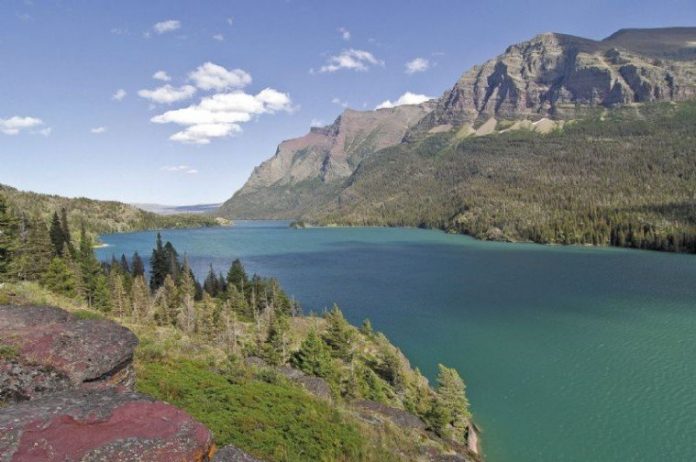If you love getting out, you probably feel that the bigger and
wilder the landscape the better.
If you love getting out, you probably feel that the bigger and wilder the landscape the better. Imagine a state slightly smaller than California with the same population as the city of San Jose. There is no need to use your imagination, just visit Montana.
Add the Rocky Mountains to this recipe, and Montana is also grand.
The Continental Divide loops and twists down through the western portion of the state tossing up some magnificent scenery. Here, Lewis and Clark, Jim Bridger, Jedediah Smith and many others ventured up to the headwaters of the Missouri River in search of beaver pelts and adventure. For years, I have read of their exploits and hoped to someday see that country.
At the invitation of two friends with summer homes in different parts of the state, Renee and I set out for a visit.
Our first stop was Flathead Lake, the largest fresh water lake in the western United States – just slightly larger than Lake Tahoe.
The lake sits in the vast Flathead Valley near the towns of Kalispell and Whitefish underneath a host of conifer-covered mountain ranges in the northern part of the state. It is also very close to Glacier National Park.
We slipped between the Swan Range and the Whitefish Range along the Flathead River, which has cut a deep, narrow gorge between the two, on our way to Apgar at the western entrance to the park.
Here begins the amazing and justly famous Going-to-the-Sun Road, the only road that traverses the park and the main tourist corridor.
Full disclosure: Montana may be sparsely populated, but not in Glacier National Park in the summer. Driving the Going-to-the-Sun Road is a bit of a parade. But what’s the hurry?
The road is an engineering marvel only exceeded by the view toward unsurpassed scenery. Unlike the granitic Sierra, the Rockies in Glacier are sedimentary rock formed at the bottom and an ancient ocean. Tectonic activity raised these sediments and ancient glaciers carved them into an incredible assortment of steep spires and cirques that truly defy description.
At Logan Pass (6,646 feet), halfway through the park, we crossed the Continental Divide and dropped down to Sunrift Gorge parking area at the west end of 12-mile long Saint Mary Lake. From here, we hiked along the edge of the lake on a fabulous 5-mile loop past three robust waterfalls, each more grand than the last.
But the highlight of the walk was the ever-present view across the milky aqua water of Saint Mary Lake toward the sheer mountain artistry beyond.
Continuing east, we left the park at Saint Mary, made a short loop and re-entered at the Many Glacier entrance. This spur road ends at the Many Glacier Hotel, a 214-room hotel built in 1914 by the Great Northern Railroad. An old-time stately inn, the hotel overlooks Swiftcurrent Lake and peers up two massive watersheds. By the time we arrived, the soft afternoon light cast an aura of gentle magnificence over a stunning setting.
Driving is distracting and tedious in a park with so much to see. Your job at Glacier should simply be looking up at the peaks, the falls, the glacier lilies and the mountain goats. To that end, you may choose to leave the driving to the “Jammers” who pilot the iconic Glacier National Park Red Buses originally built in the 1930s and now restored for park tours. There are also boat tours available that cruise the park’s larger lakes.
It’s not a quiet retreat, but Glacier National Park takes the cake as a truly scenic wonder.










